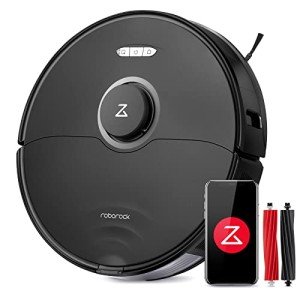The Rise of Robotic Vacuums: Transforming Home Cleaning
In the modern age, convenience plays an essential function in the method we manage our families. Among the most significant innovations that have actually reinvented home cleaning is the robotic vacuum. These autonomous devices have actually acquired immense popularity for their capability to navigate through homes, selecting up debris and dust with very little human intervention. This post supplies an in-depth look at robotic vacuums, their functions, benefits, and factors to consider for potential purchasers.
Comprehending Robotic Vacuums
A robotic vacuum is a compact, self-operating cleaning device created to autonomously tidy floorings. Running within a pre-programmed pattern or course, they utilize numerous sensing units to browse their surroundings, avoiding obstacles and efficiently covering floor area. mop and vacuum robot can be found in different models, each catering to various cleaning requirements and environments.
Key Features of Robotic Vacuums
| Feature | Description |
|---|---|
| Navigation System | Uses sensors (like LIDAR, infrared, and electronic cameras) to map and browse a space. |
| Suction Power | Varies in between designs; essential for effective cleaning on various surfaces. |
| Battery Life | Period the vacuum can operate before needing a recharge, normally varies from 60 to 120 minutes. |
| Dustbin Capacity | Size of the dust bin, affecting how often it needs to be emptied, typically varies from 0.3 to 1 liter. |
| Smart Features | Consists of scheduling, mobile phone integration, and voice command compatibility with devices like Amazon Alexa or Google Assistant. |
| Height and Design | Affects the ability to fit under furniture; most robotic vacuums are around 3-4 inches tall. |
Advantages of Using Robotic Vacuums
Robotic vacuums provide a myriad of advantages, boosting the quality of life for users. Here are some of the key advantages:
- Time-Saving: By automating the cleaning process, users can release up time for other crucial activities.
- Consistency: Robotic vacuums offer routine cleaning schedules to maintain cleanliness, reducing dust build-up.
- Accessibility: They can quickly access tight areas under furnishings where conventional vacuums might struggle.
- Advanced Technology: Most modern models come equipped with advanced navigation and cleaning innovations for effective operation.
- User-Friendly: With mobile apps and voice controls, operating robotic vacuums has actually never been simpler.
- Remote Monitoring: Many models permit users to keep track of cleaning development and change settings from another location.
Considerations Before Purchase
While robotic vacuums can considerably improve home cleaning, possible purchasers must know their restrictions and crucial considerations:
- Cost: Robotic vacuums can differ widely in cost, from inexpensive alternatives to high-end models with advanced features.
- Cleaning Power: While effective for light debris, they might battle with heavy dirt or carpets compared to traditional vacuums.
- Maintenance: Regular cleaning of the device itself (e.g., clearing dust bins, changing filters) is important for ideal efficiency.
- Home Layout: Homes with intricate layouts or lots of barriers may need models with advanced navigation technology.
- Battery Life: Consider the size of your home and whether the vacuum can complete its cleaning cycle without requiring a recharge.
Popular Robotic Vacuum Models
Various models have emerged on the market, each offering unique functions and capabilities. Here's a take a look at some of the most popular robotic vacuums in 2023:
| Model | Secret Features | Price Range |
|---|---|---|
| Roomba s9+ | Excellent suction power, self-emptying | ₤ 999 - ₤ 1,199 |
| Roborock S7 | Mopping capability, wise mapping | ₤ 649 - ₤ 749 |
| Eufy RoboVac 11S | Economical, slim style | ₤ 199 - ₤ 299 |
| Neato D8 | Distinct D-shape for corners, strong suction | ₤ 499 - ₤ 599 |
| Dyson 360 Heurist | Advanced mapping, powerful cleaning | ₤ 999 - ₤ 1,200 |
Frequently Asked Questions (FAQs)
Q1: How do robotic vacuums work?
Robotic vacuums utilize sensors and mapping technologies to navigate and tidy floors. They frequently have pre-set schedules and can go back to their docking stations to recharge when required.
Q2: Do robotic vacuums tidy effectively on carpets?
High-end robotic vacuums with strong suction capabilities are designed to work on carpets. However, for deep cleaning, a standard vacuum may still be required occasionally.
Q3: How often should I use a robotic vacuum?
A lot of users find that running their robotic vacuum every day or every other day keeps their spaces clean and workable.
Q4: Can robotic vacuums be utilized on multiple surface areas?
Yes, lots of robotic vacuums are developed to shift perfectly in between floors, carpets, tiles, and hardwoods.
Q5: Are robotic vacuums loud?
Generally, robotic vacuums run at a lower noise level compared to standard vacuums. Noise levels can differ by model, so taking a look at user reviews may help identify what to anticipate.
Q6: Is a robotic vacuum worth the investment?
This depends on your way of life and cleaning habits. For hectic homes or those looking for benefit, the financial investment in a robotic vacuum can considerably enhance cleaning performance.
As technology continues to advance, the vacuum industry is progressively accepting the convenience and innovation of robotic cleaning options. Robotic vacuums not just alleviate users of regular cleaning jobs however also supply sophisticated functions aimed at making cleaning effective and simple. Whether you are a veteran admirer of tech gizmos or simply looking for a method to keep tidy floorings with very little effort, a robotic vacuum may show to be a deserving investment for your home.

